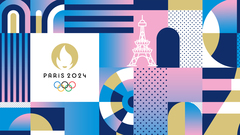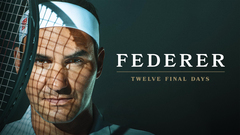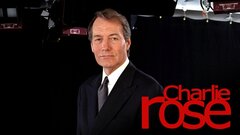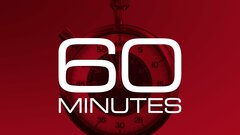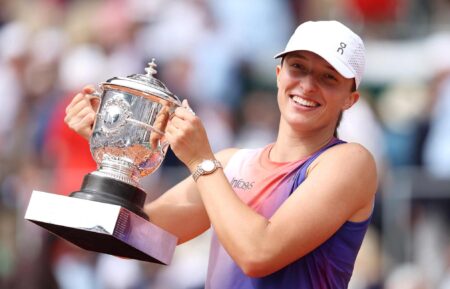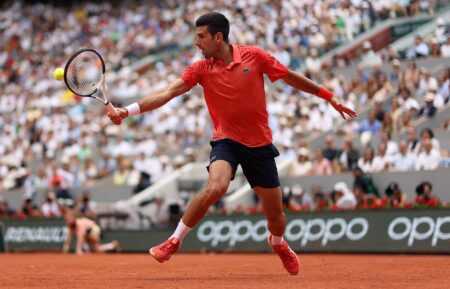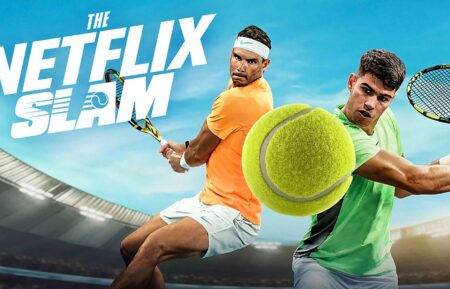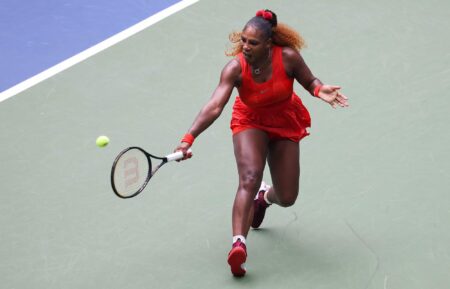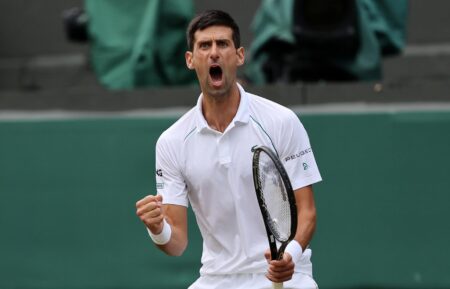One of the world's top-ranked tennis players for over a decade, Spanish-born Rafael Nadal amassed a staggering amount of titles, including the record for most French Open wins, a 2008 Olympic gold medal and a Career Golden Slam, all before reaching his 30th year. A fast, aggressive athlete with a formidable serve and topspin, Nadal's style served him well against some of the best names in the game, including fellow No. 1 players Roger Federer and Novak Djokovic, with whom he enjoyed some of the most thrilling court rivalries of the 2000s, including storied matches at Wimbledon, the French Open and U.S. Open.
On occasion, Nadal's strength and tenacity, especially on the clay courts that yielded some of his greatest wins, actually hindered his play through recurring injuries that forced him to drop out of significant matches and in one case, yield his No. 1 status to Federer. These setbacks had a deleterious effect on Nadal's career in 2011 and 2012, resulting in his drop from No. 1 to No. 4 in the world, and he spent much of 2012 and beyond rebuilding his standing on the international circuit one match at a time. Nadal's intense court presence and exceptional body of titles and accolades, which placed him in the company of such legendary figures as Federer, John McEnroe, Pete Sampras and Bjorn Borg in regard to record numbers of wins, cemented his position as one of the most accomplished figures in modern world tennis.
Born Rafael Nadal Parera on June 3, 1986 in Manacor, a town on the Spanish island of Majorica, he was the elder of two children by businessman Sebastián Nadal and his wife, Ana Maria. Sports were an integral part of his extended family - his uncle, Miguel Ángel Nadal, was a professional soccer player, while another uncle, Toni Nadal, played professional tennis - and Nadal himself played tennis and football throughout his childhood. But it was the former sport where Nadal showed the greatest promise, prompting his uncle Toni to take him under his wing to hone his nascent talents. By the age of 8, Nadal had won his first regional championships, and within four years' time, had captured both the Spanish and European titles in his age group. He made his debut as a professional player at the age of 15, reaching the semifinals of the Boys' Singles tournament at Wimbledon in less than one year.
The titles and accolades soon began to accumulate at a dizzying rate: the 15-year-old Nadal won his first Association of Tennis Professionals (ATP) match in 2002, which quickly elevated him from No. 762 on the World ranking to the Top 50. A year later, he was the youngest player to reach the third round of Wimbledon since Boris Becker in 1984, and defeated future rival Roger Federer - then the World No. 1 player - in their first match at the Miami Masters that same year. In 2004, Nadal helped his Spanish teammates clinch the Davis Cup by defeating the World No. 2 player, Andy Murray, which also made him the youngest player to win a singles victory in a Cup match. Ranked fifth in the world after a series of high-profile wins at the Monte Carlo and Rome Masters in 2005, he quickly advanced to No. 3 after defeating Federer and Mariano Puerta to win the French Open that same year. In doing so, he became only the second male player to win the storied event in his debut appearance, and the first teenager to win a Grand Slam title since Pete Sampras in 1990. By the end of 2005, Nadal was ranked second in the world, a title he would hold throughout 2006 through stunning upsets against Federer in Dubai, Monte Carlo and the French Open. However, injuries also hampered his game throughout the year, resulting in losses to Federer at Wimbledon and the Tennis Masters Cup.
Their battles extended to the following year, with Federer ending Nadal's streak of 81 wins on clay at the Masters Series Hamburg and later second losses at Wimbledon and the Tennis Masters, while Nadal took the 2007 French Open and "Battle of Surfaces" exhibition match on a half-clay, half-grass court in his native Mallorca from his rival. Nadal also struggled with a knee injury, which hampered play in the second half of the year, including the U.S. Open, where he lost to David Ferrer. After closing 2007 by founding the Fundación Rafa Nadal, which benefited social work and development aid for children, he rebounded in spectacular fashion in 2008, defeating Federer in Monte Carlo, Hamburg and the French Open, which made Nadal the fourth male player since 1968 to win the same Grand Slam title in four consecutive years.
Nadal soon added another laurel to his growing c.v. by handing Federer a fifth-set upset at Wimbledon in an epic-length match played in near darkness due to rain delays that firmly established him as the top-ranked player in the world. He closed out the year with a gold medal at the Beijing Olympics and a win against the United States in the Davis Cup semifinals, but was also forced to drop out of several significant matches to recurring problems with his knee. Though he took the Australian Open from Federer in 2009, the injury plagued Nadal throughout the year, costing him title wins at the Australian Open, Miami Masters and French Open before withdrawing from Wimbledon, which forced him to yield his No. 1 standing to Federer. He ended his difficult year at No. 2 before launching a determined campaign to reclaim the top spot.
Nadal worked steadily through the international matches, though the knee injury again proved a major obstacle in his pursuit. But by mid-2010, he had fully returned to form, taking the French Open from Robin Soderling and regaining his No. 1 status while also tying with John McEnroe and Mats Wilander with seven Grand Slam tournament titles. Nadal soon steamrolled over the competition at Wimbledon, defeating Andy Murray in straight sets which provided him with his first "Old World Triple," the term given to wins in Rome, the French Open and Wimbledon in a single year. A few months later, he took the U.S. Open from Novak Djokovic, which granted him the Career Grand Slam with wins in all four major tennis championships. Nadal also became the second player in history after Andre Agassi to possess a Career Golden Slam, which was signified by the four Grand Slam wins and an Olympic gold medal. He closed their year on a downbeat note with a loss to Federer at the ATP World Tour Finals and withdrawal from the Paris Masters, but few could argue with the fact that Nadal had enjoyed a historic 2010 season.
Injury and exhaustion robbed Nadal of titles in Qatar and the first round of the Australian Open in 2011, which set the tone for another difficult year. Novak Djokovic handed him a series of tough losses at Indian Wells, Madrid, Rome, the U.S. Open and the Sony Ericsson Open before ultimately robbing him of his No. 1 status at Wimbledon. The downward trend of his career continued into 2012 with a loss to Djokovic at the Australian Open and withdrawal from the Miami Masters due to knee problems. Nadal avenged his string of losses to Djokovic by topping him in Monte Carlo, Rome and the French Open, where his seventh win made him the most successful tennis player in the tournament's history.
But the afterglow of his victory was soon darkened by a stunning defeat at Wimbledon to Lukas Rosol, who was ranked 100th in the world. His loss in the second round was widely regarded as one of the most shocking defeats in Grand Slam history. Nadal's terrible year was further compounded by a bout of tendinitis that forced him to withdraw from both the 2012 Olympics in London and the Rogers Cup. By the close of 2012, he had dropped to No. 4 in the world, his lowest ranking in nearly a decade. Nadal then began 2013 on a sour note, withdrawing from the Australian Open due to a stomach virus.
But he soon launched a slow but steady progression of wins, first at the Brasil Open, and later in Acapulco and Indian Wells. However, Djokovic halted his advance with a defeat in straight sets at Monte Carlo, but the loss appeared to energize Nadal in a manner that fans had not seen since 2010. In rapid succession, he took Barcelona and Madrid before bringing Federer down in Rome for his seventh championship in that city. By May of 2013, Nadal had climbed out of the lower half of the Top 10 to reclaim his ranking as World No. 4, an impressive feat in the face of so many challenges.



